‘I feel considerable unease’ – Justice Green
The two young Burmese accused of the murders of Hannah Witheridge and David Miller on the Thai island of Koh Tao were sacrificed by the British authorities in the interests of continued police co-operation between the Royal Thai Police and Scotland Yard.
Ruling that the defence could not be given the whole or parts of the Scotland Yard report, on which the families issued damning statements through the Foreign and Commonwealth Office implying the guilt of Zaw Lin and Wai Phyo, a High Court Judge however said he felt uneasy.
Scotland Yard had presented the ‘chilling effect’ argumeent – that the release of the report could cause a breakdown in co-operation between the law enforcement authorities of Thailand and the United Kingdom.
Counsel for the prosecution Anya Proops had argued that such was the power of the British public interest that it would still trump private interest – even though this caused Justice Green ‘considerable unease’ in a capital punishment case where ‘the stakes could not be higher’.
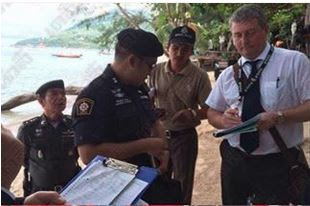 |
| Brit police on Koh Tao |
The ‘chilling effect’ was the ‘substantial and adverse effect on law enforcement, fulfilment of public policy and the UKs security objectives’.
But what appears clear from the judgment is that Scotland Yard officers, even in their ‘observational role only’ were not present at any interviews, were not witness to any DNA procedures, and were reliant on the documents and videos placed in front of them and what they were told through a Thai police interpreter, or English speaking Thai officers.
Nevertheless the report, made specifically for the families of the two victims, then led the families to issue statements through the Foreign and Commonwealth Office saying that the evidence against Zaw Lin and Wai Phyo ‘appeared powerful and convincing ‘and also led the Thai authorities to comment:
‘Relatives of the deceased in the UK have stated that they are confident in the evidence in the Koh Tao case and that the evidence was clear beyond a shadow of doubt’.
Judge Green said he gave weight to the assertion by Gerry Facenna, counsel for Zaw Wyn and Wai Phyo, that these statements had prejudiced the trial.
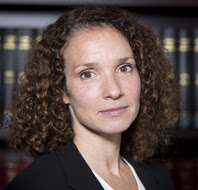 |
| Anya Proops |
The author of the report Scotland Yard report Detective Chief Inspector Lyons said he had written an impartial report with no value judgments about the Thai police operation.
But he appeared to counter claims by the two Burmese that they were forced to confess after torture by stating that they had confessed on a number of occasions including ‘in front of a judge and in the presence of their own counsel’.
Ironically one of the objections made by Anya Proops for Scotland Yard was not only the sensitivity of the Thai government to the case and the risk that the report might be used to engender further public criticisms, but also importantly that the release of details of the Scotland Yard report could ‘prejudice the trial’.
The judge explained why he was troubled.
“I cannot ignore the fact that this is a death penalty case conducted with the accused arguing with their eyes closed.’.
He posed a theoretical case.
“A foreign prosecutor fails to disclose to a defendant a key piece of evidence of great value to the defendant in a criminal case. This item is however recorded in an MPS report and amounts to personal data.
The report explains that there is compelling evidence that the foreign forensic scientists employed by the police abroad have mixed up DNA samples. It also records that the prosecution are nonetheless seeking to rely in court upon the wrong DNA evidence to inculpate the accused.
This entry might be pivotal to the defence and might quite literally represent a matter of life or death. In those circumstances does the Court sacrifice the accused for the wider principle of comity and trust between authorities? Ms Proops for the MPS submitted that such was the power and force of the public interest objectives the MPS advanced that even in such extreme circumstances the public interest would still trump the private interest.
“Does the court sacrifice the accused for the wider principle of comity and trust between authorities?…
As he made his ruling rejecting the application made on behalf of the two young Burmese he said:
“I feel considerable unease. I sit a long way from the seat of the trial and do not have a true hands-on feeling for the way evidence has been tendered by the prosecution or the main lines of defence.”
The High Court had heard in August, that even though the trial was underway,. counsel representing the two young Burmese had no way of getting access to the records of the trial.
Such are the ways of the international diplomacy – the Foreign and Commonwealth and British law enforcement authorities have of course been acting in British political, policing and security interests. What is expedient counts. It is remotely possible that continuing good relations with Thai police could save lives, though more immediate is the Thai prosecutor calling for the deaths of two Burmese in jail in Koh Samui.
Of course Justice Green in London was oblivious to what was going on in the court on Koh Samui and in that it would have been difficult, as he virtually admits, to confidently judge what would be detrimental to the defence or more importantly useful.
In the trial many prosecution claims, and by that I mean also Thai government and police claims, appear to have been blown apart.
Of course I cannot say that for sure. Reporters are not allowed to take notes. The judge often just gives a precis of evidence, which he finds relevant, into a tape recorder for transcription.
The ‘running man’ in the prosecution’s evidence has been discredited by a British expert forensic witness in a statement could not possibly ne either of the Burmese.
 |
| Porntip |
The forensic team of defence witness Porntip Rojanasund, Thailand’s chief forensic officer, found the DNA of two males on the alleged murder weapon, the hoe, while police could find nothing.
The post mortem conducted by Thai police on Hannah is contradicted by the post mortem done in the UK.
Police never checked the CCTV of people leaving the island on the morning of the murder because they did not consider it important. The list goes on and on.
And Thailand’s Police Commissioner has claimed that his officer and Scotland Yard ‘read the same books’.
It cannot be denied that the Metropolitan Police ‘chilling effect’ case seemed compelling. If the Royal Thai Police were to stop co-operating the Scotland Yard it could, one supposes at first glance, be disastrous.
Thailand is now a well-known hub for British criminals wishing to keep out of the away of the legendary ‘long arm of the law’, though that long arm might be exaggerated.
Thailand is also a place where terrorist activity takes place. Britain needs to control its criminals and people who might seek to cause terror in the UK.
But is a breakdown in international police relations a serious scenario?
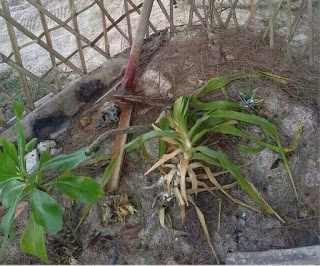 |
| Murder weapon |
Probably not. Should that happen and Thailand blank international police co-operation it would be seen as a pariah state.
Thailand wants to be respectable. It wants to operate on the world stage.
Would Thailand keep secrets from Scotland Yard? Maybe; but it does that anyway. Thai Police only reveal what they want to.
Besides Thailand has a short memory – and what happens under this government, well, happens under this government.
The current military government admits there is massive corruption in the Thai police – which is frequently referred to as a ‘mafia’ organization.
The widespread raids last year on Thailand’s Central Intelligence Bureau and Crime Suppression Division – and clear-out of some 70 per cent of its senior officers involved in just about every racket in the book – speaks for itself.
 |
| Kirsty Jones |
And in terms of the murders of foreigners in Thailand the Thai Police have a track record of attempting to set up non Thais (as in the Kirsty Jones murder and rape case in Chiang Mai) and interference in the course of justice as in the Leo del Pinto murder case in Pai Mae Hong Son and complaints of torture abound.
In the case of Kirsty Jones, some 12 years of co-operation and not offending Thai police got Dyfed-Powys Police nowhere.
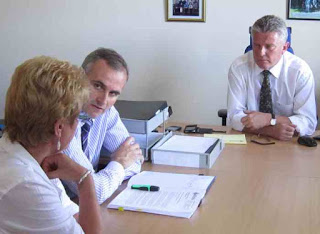 |
| Dyfed Powys Police with Sue Jones – Kirsty’s mother |
The fact is that Scotland Yard may not want to go public in its dealings with Thai police because also quite simply there are skeletons there to be found by very virtue of how the Thai police work.
Detective Chief Inspector Lyons’s report made no comments giving an opinion of the Thai police investigation.
Shortcuts are taken by the RTP which would be viewed dimly back home in the public arena.
Thai police almost always need encouragement and they are not always satisfied with a slap on the back and a ‘Well done’.
In fact there is nothing under the sun the Thai Police cannot do except perhaps read the same books as Scotland Yard and apply what they have read.
 |
| Flying Sporran – London Sept 24 |
Despite massive technological breakthroughs Thai police still show a limited grasp of what is available and still prefer to rely on ‘confessions’. And all too often the courts simply accept them.
And behind the Foreign Office’s ‘non interference in the justice system of other countries’ lies a pile of Britons often set up for crimes they did not commit abroad – let alone Burmese facing death row.


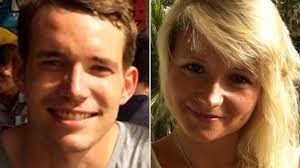
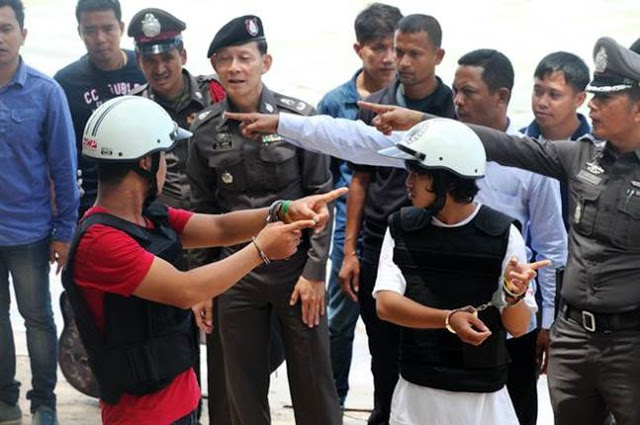
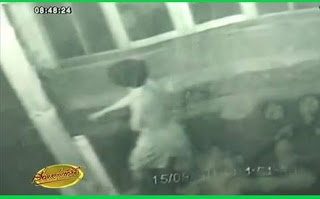



Cooperation between Scotland Yard and the Royal Thai Police at stake? I wonder what level of cooperation the Thai police provides when the country is full of fraudsters that hire off duty police officers to provide around the clock security? What, is Scotland Yard on Paul Hilton's tail, and are working closely with the RTP to finally nail his ass? From what I see, the only level of cooperation is the level by which the British Embassy stays "neutral" from any intervention on behalf of its citizens regardless of how absurd the charges might be. How many appaling cases have been discussed over the years and how many of them have had any successful intervention by diplomatic or law enforcement cooperation from Scotland Yard? How many British nationals or criminals planning to cause harm to British interests has the Thai police surrendered to Scotland Yard? This is what Mr. Green felt so compelled to protect? Laughable.
hear hear
I think it is more than clear that the judge said he could find nothing which could help the defence. The point is not seeing what was going on he was not in a position to really judge and used his common sense as to how the case would be presented in a Thai court. To second guess what happens in Thailand is a dangerous business. Having said that it was refreshing to see the soundness of the judge. His judgment and how he came to it was detailed, fair, and understandable. Scotland Yard did not as far as I can see go into any detail on its relationship with the Thai police. Their view was that it would be unfair and prejudice future relationships and co-operation claiming protection under the Data Protection Act.
I think the article is less than 100% fair. The key fact for Judge Green was that there was no exculpatory value to the material, and only once he determined that did he allow the "chilling effect" claim to stand. This fact is not even mentioned. I'm not saying he was necessarily right to reach this conclusion, or even to see himself as the authority for deciding whether the material had such value, but that's beside the point.
I think the description is slightly unfair, as at the heart of Judge Green's decision was his assessment that the material has no exculpatory value, and this is not mentioned at all.
Re: Scotland Yard had presented the ‘chilling effect’ argument – that the release of the report could cause a breakdown in co-operation between the law enforcement authorities of Thailand and the United Kingdom.
I do not accept this as a valid argument. Scotland Yard must be held accountable for the reports they release. One cannot allow law enforcement agencies to release "manufactured" reports without scrutiny, There was no need for Scotland Yard to manufacture a report that could be construed that the Thai police were on top of the situation and the accused Burmese were guilty. They could have stepped aside and said they did not have sufficient evidence to create a report. Possibility of sacrificing two innocent lives for the good of public relations is not acceptable.
The link was okay but the comment was construed as offensive
Its time these parents stood up to what they really think. Surely they now know they have been hoofwinked by Scotland yard into beleiving these kids were the killers.
They have blood on their hands if they dont